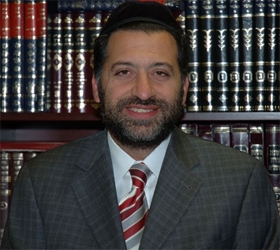The Gemara in Masechet Berachot (9a) notes a seeming contradiction between two verses that mention Yesiat Misrayim (the Exodus from Egypt). On the one hand, the Torah in Sefer Debarim (16:1) says, “Hosi’acha Hashem Elokecha Mi’Misrayim Layla” – “Hashem your G-d took you from Egypt at night” – clearly stating that Beneh Yisrael left Egypt during the nighttime. On the other hand, in Sefer Bamidbar (33:3), the Torah says that Beneh Yisrael left Egypt “Mi’maharat Ha’pesah” – the day after the offering of the Pesah sacrifice, during the day of the 15th of Nissan. To reconcile these verses, the Gemara explains that the redemption unfolded in two stages – it began at night, but was completed the next day.
How might we explain these two stages of redemption?
Our ancestors suffered two forms of subjugation in Egypt – physical and spiritual. Physically, of course, they were persecuted and enslaved, forced to perform backbreaking labor, and having their newborn infants taken from them and killed. But in addition, Beneh Yisrael were submerged in a dismal spiritual exile. Ancient Egypt was an especially decadent society. Idol-worship was rampant, as was immorality. Living in such a culture for over two centuries, Beneh Yisrael experienced a sharp decline. The Zohar famously teaches that Beneh Yisrael had fallen to the “49th level of impurity” – one very small step away from the 50th level, from which they would have been unable to recover. The environment in Egypt had become so contaminated that it had a corrosive impact upon our ancestors’ souls, causing them to be defiled.
On the night of Yesiat Misrayim, Beneh Yisrael experienced spiritual redemption. They partook of the Pesah sacrifice and Masa, and they remained in their homes throughout the night. They were required to remain in their homes not only to protect themselves from the plague of the firstborn which descended upon Egypt that night, but also to shield themselves from the spiritually defiled environment of Egypt. Families stayed at home together, eating their sacrifices, thereby extricating themselves from the impure forces that prevailed in Egypt. The next morning, they experienced physical redemption, leaving Egypt and making their way toward Mount Sinai and then toward the Land of Israel.
In the Haggadah, we read about five great Rabbis – Rabbi Eliezer, Rabbi Yehoshua, Rabbi Elazar Ben Azarya, Rabbi Akiba and Rabbi Tarfon – who once spent the night of the Seder together in Beneh Berak, “and they spoke about the Exodus from Egypt that entire night.” Some commentators explain the final phrase – “that entire night” – as referring not to when these Rabbis spoke about Yesiat Misrayim, but rather the content of their discussions. They focused not on the “daytime” redemption, the physical redemption from slavery, but rather on the “nighttime redemption,” the spiritual redemption that Beneh Yisrael experienced. They felt that this was the component of Yesiat Misrayim that demanded greater attention.
This is certainly the case nowadays, as well. Thank G-d, we do not suffer physical slavery. We enjoy wonderful freedoms. We are, however, submerged in a spiritual exile, subject to the powerful cultural influences of our society. Pesah offers us the precious opportunity to free ourselves from this spiritual bondage. The Arizal (Rav Yishak Luria, 1534-1572) taught that each year, on the first night of Pesah, we are able to reexperience “Ge’ulat Ha’nefesh” – spiritual redemption. The special power that G-d provided for our ancestors in Egypt is given to us every year at the Seder, enabling us to release ourselves from the chains of our spiritual exile. We, too, like our ancestors, live in a society plagued by severe spiritual ills, and we cannot avoid being affected by this decadent culture. On the night of Pesah, we assemble with our families in our homes to reexperience spiritual redemption, to achieve freedom from the impure forces to which we are subjected. This is a special opportunity granted to us each year, to be freed from our spiritual exile and elevate ourselves to greater heights of Kedusha.
* * * * * * * * * * * * * * * * * * * *










